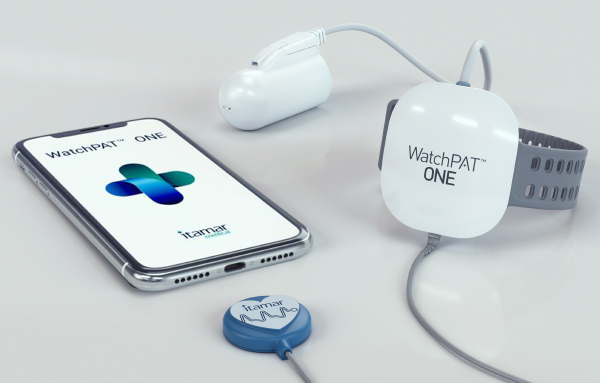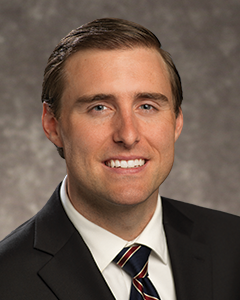 The device, which comprises a wristband and finger and chest sensors, collects and transmits data through the patient's smartphone. Credit: WatchPAT ONE by Itamar Medical
The device, which comprises a wristband and finger and chest sensors, collects and transmits data through the patient's smartphone. Credit: WatchPAT ONE by Itamar Medical
When NKCH patients require a sleep study for suspected obstructive sleep apnea, they now can turn to a disposable diagnostic device they can use at home beginning next month.
Diagnosis
The WatchPAT® ONE device comprises a wristband and finger and chest sensors that collect data on peripheral arterial tone, heart rate, oxygen saturation, body position, and movements of the chest and body.
The device is mailed to the patient and pairs to an app on the patient’s smartphone. NKCH-registered polysomnographic technologists and sleep medicine physicians evaluate the transmitted data, and those physicians formulate a report for the ordering clinician.
The FDA-approved device is covered by many insurance carriers.
“This technology improves access to testing for OSA by increasing convenience for patients who are unable to perform traditional sleep testing at our facility,” said NKCH Diagnostic Sleep Center Medical Director Scott M. Shorten, MD, a neurologist and sleep medicine specialist with Meritas Health Neurology. “It has an 89% correlation with a traditional polysomnogram.”
Indications
Patients with a high probability of OSA -- based on loud snoring, pauses in breathing, frequent awakening or excessive daytime sleepiness -- are good candidates for home WatchPAT testing,” Dr. Shorten said.
Other symptoms of OSA can include difficulties with memory and concentration, mood problems, morning headaches and dry mouth. Risk factors include hypertension, being age 50 or older, smoking, a BMI greater than 30, and a neck circumference greater than 17 inches for men and 16 inches for women. Untreated OSA is associated with hypertension, stroke, coronary artery disease, congestive heart failure and diabetes.
Further Testing
If a home sleep apnea test does not show OSA, the patient may need more comprehensive testing at the NKCH Green Hills Diagnostic Sleep Center for evaluation of other sleep disorders.
The center is accredited by the American Academy of Sleep Medicine, the leading accrediting agency for sleep services. Registered polysomnographic technologists are specially trained and experienced in conducting tests for all sleep disorders.

Scott M. Shorten, MD
Dr. Shorten earned his medical degree from the University of Kansas School of Medicine. After completing his internship in internal medicine and residency in neurology at KU Medical Center, he was a fellow in sleep medicine at Vanderbilt University.